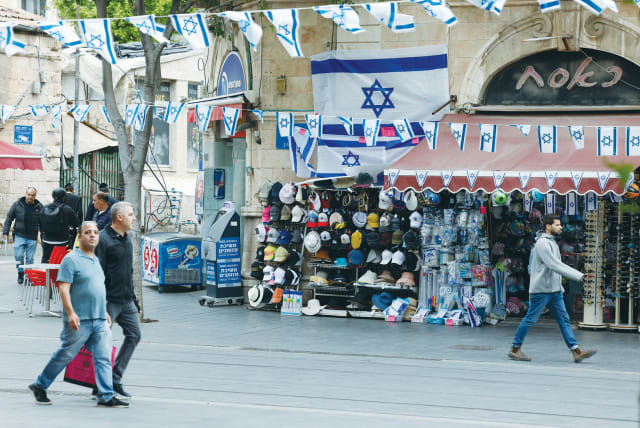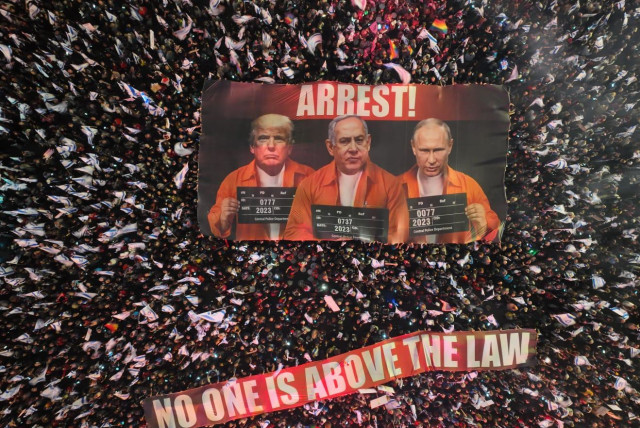My word: The Israeli dream

For decades, Israel has wanted to live the American dream - now it turns out that it’s a nightmare of polarization and hate-filled rhetoric.
"Be careful what you wish for," goes the conventional wisdom. It’s a phrase that comes to mind in the ongoing turmoil in Israel attributed to the government’s judicial reform plan.
For decades, Israel has wanted to live the American dream. Now, it turns out that it’s a nightmare: The polarization and hate-filled rhetoric that have engulfed US politics and society – particularly around the 2016 election of Donald Trump – is being reflected in the reaction to the reelection of Benjamin Netanyahu as prime minister in November 2022.
American-style polarization
There were American-style protests during Netanyahu’s previous terms in office, but this time, the demonstrations are “bigger and better” in US marketing terms. It’s no coincidence that the huge protest banners with the clenched fist symbol have the slogan “Resist” written in English. They are aimed for foreign media consumption. Attempts to explain Israeli society and politics in American terms are usually misleading. Not everything is black and white, Left and Right.
The mass protests have undergone a change during the last four months. Initially concentrating on the judicial overhaul, they quickly turned into protests against the election results that placed Netanyahu and his coalition in control. Recently, they have morphed into calls for “sharing the burden,” spotlighting the fact that most of the ultra-Orthodox do not serve in the military while receiving generous state stipends to support large families. The fact that the Arab citizens also don’t serve is usually ignored; I favor a form of national service – military or civil – for all.
Although you can find religious protesters at the demonstrations against Netanyahu and the judicial reform, and there are secular participants in the pro-reform rallies, in each case they are the minority. Some commentators are describing the current split in terms of Israel vs Judea, pulling on something ancient and tribal – the divide between those who want a clearly religious state and those who fear it.
Naturally, ahead of Remembrance Day for fallen soldiers and victims of terrorism back-to-back with Independence Day this week, passions were further inflamed. Still, there are voices of reason speaking out.
Author and educator Rabbi Chaim Navon, writing in Makor Rishon last week, declared: “Even when we are fighting among ourselves, both sides are proud to wave Israeli flags. We argue over whether Israel needs to be more Jewish or more democratic, but studies show that the vast majority agree that it needs to be both. It’s all a matter of definition.”
Noting that only the Jewish element is mentioned in the Declaration of Independence, which like the flag, has undergone a recent revival in popularity, Navon nonetheless stresses that there does not have to be a contradiction between the two.
“If you interpret ‘a Jewish state’ as a ‘halachic state,’ and a ‘democratic state’ as a progressive state, then you will find contradictions at every corner, but that is not the meaning that the founders of the state were thinking of,” wrote Navon.
“It’s hard to understand how the specter of a halachic state grew to such monstrous proportions,” he continued.
“Everyone understands that any attempt to force the secular to put on tefillin by law would be catastrophic, not only socially and spiritually but also meaningless from a halachic point of view.
“On the other hand, when the state’s founders wanted democracy, they certainly didn’t think of creating a state of crazy progressiveness. Basic liberal tolerance is always desirable, but attempts to force on all of us the values of the extreme Left of American academia will come up against a wall. The legal establishment that today, in the name of equality, bans religious female singers from appearing before women-only audiences are not promoting democratic values, but mortally wounding them.”
When democracy is interpreted in a moderate way, Judaism does not conflict with it, Navon noted. Jewish values actually further it.
But the clash over judicial reform is self-fueling. Social media foster the need for instant gratification – likes, shares, comments. Ramifications of acts and messages are not important, it’s all about the here-and-now. Worst comes to worst, something on social media can be deleted, opponents blocked or “canceled.”
When IDF armored corps veterans in February took an old tank from a memorial site on the Golan Heights to serve as a prop in an anti-reform protest, I correctly surmised that calls to refuse to serve wouldn’t be far behind. I did not imagine, however, the scope of refusals by pilots and among other mainly elite units.
Taboos are being broken. Sacred cows are not only being slaughtered, they are being barbecued. Commonsense is going up in the smoke.
Over Passover earlier this month, a neurologist at Beersheba’s Soroka Hospital made sure he was filmed carrying bread into the medical center. Department head Prof. Gal Ifergane said he took the step to protest the law allowing hospitals to ban leavened products from their premises. The fact that it was Ramadan and a large number of Muslim staff and visitors would also have been fasting adds to the absurdity of Ifergane’s antics in violating religious sensibilities.
The incident raises disturbing questions about whether a doctor could be so unhealthily driven by a personal obsession that it affects their judgment.
Also upsetting was the incident on Holocaust Remembrance Day last week when an El Al pilot en route to New York thought it acceptable to make a political comment over the public address system. “Things like the Holocaust are potentially carried out in a dictatorship, and we are fighting in Israel to remain a democratic country,” said the captain, who now faces disciplinary measures and possible dismissal. When you hear the words “this is your captain speaking...” you don’t want them to be followed by a political message, and a grossly distorted one at that. Every airline passenger wants to think of the pilot as being calm and focused on the job in hand. Politics should be kept out of the flight deck.
How did we get into this situation? It’s partly because people are playing to their own audience, within their own echo chambers and social circle. Too many people no longer care to listen to the views of others. They simply dismiss as stupid or irrelevant those who have differing opinions.
Also on Holocaust Remembrance Day, Likud MK Boaz Bismuth was so badly heckled by anti-reform protesters at a memorial event at a Tel Aviv synagogue that he had to be accompanied out by police. Nobody gains from such behavior.
Who gets to decide?
From there it was a small step to the heartbreaking discussions this week ahead of the Remembrance Day ceremonies, which some bereaved families threatened to disrupt if an MK or a minister they didn’t approve of attended as the official state representative. Yet again, the question arises, who gets to decide?
Refusing to recognize members of the elected government in the name of democracy contains its own stunning built-in paradox. It is also another example of the “my way only” philosophy. The grieving relatives – like the fallen soldiers and terrorism victims – come from all sectors of society and can be expected to have different social, political and religious views.
The country needs to find a way forward. When those disappointed in the election results mount something close to a coup to overturn them – be it Left or Right – we will find ourselves in endless cycles of ballots and never-ending vitriol. The result will not be democracy but anarchy.
The word “Halacha” – Jewish law – incorporates the root letters for “walk”; it means going forward. Ditto “Progress.” We need evolution, not revolution.
Ultimately, the one thing we can control are our own responses. One thing is clear, no matter what we want, our fate as a country is shared – preferably in peace and prosperity. What we need is commonsense and compromise rather than provocations and wild protest measures.
This is not America. And that’s good. We could celebrate our own independence and special identity as the one Jewish state. And so people raised their eyes in prayer and to watch the traditional flypast; the song “Ein Li Eretz Aheret” (“I have no other country”) was voted the top song of 75 years; and the smoke came from barbecues in gardens and parks. The Israeli dream lives on.
liat@jpost.com
Jerusalem Post Store
`; document.getElementById("linkPremium").innerHTML = cont; var divWithLink = document.getElementById("premium-link"); if (divWithLink !== null && divWithLink !== 'undefined') { divWithLink.style.border = "solid 1px #cb0f3e"; divWithLink.style.textAlign = "center"; divWithLink.style.marginBottom = "15px"; divWithLink.style.marginTop = "15px"; divWithLink.style.width = "100%"; divWithLink.style.backgroundColor = "#122952"; divWithLink.style.color = "#ffffff"; divWithLink.style.lineHeight = "1.5"; } } (function (v, i) { });

